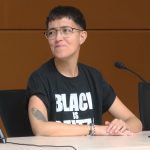Cineground: A Portuguese Queer Cinematography of the 1970’s
Joana de Sousa
Cultural producer, curator and filmmaker
A Portuguese Queer In 1975, artist Óscar Alves and filmmaker João Paulo Ferreira founded the amateur film production cooperative Cineground. Inspired by the films of Andy Warhol, which reached Portugal after the 1974 Revolution that ended decades of repressive dictatorship, Cineground regarded Super8 as a “professional format”, exploring its technical limits to ensure the best artistic results possible. The group addressed for the first time in Portuguese cinema non-normative sexualities and gender expressions, something that was still criminalized in the 1970’s. Underground filmmaking at its core, they screened their films in bars and nightclubs, developing an alternative screening circuit. The cooperative was short-lived, ending in 1978, but left an important heritage within the queer history of Portugal. Before passing, Óscar Alves donated his screening rights to Queer Lisboa International Film Festival. Now, in a joint effort with Cinemateca Portuguesa, the surviving prints are being preserved and digitized.
Cineground’s archive poses many important questions: how to preserve, activate and remediate LGBTQI+ collections, especially those which were produced under precarious conditions, requiring specific cataloguing and restoration methods?

 ES
ES EUS
EUS





